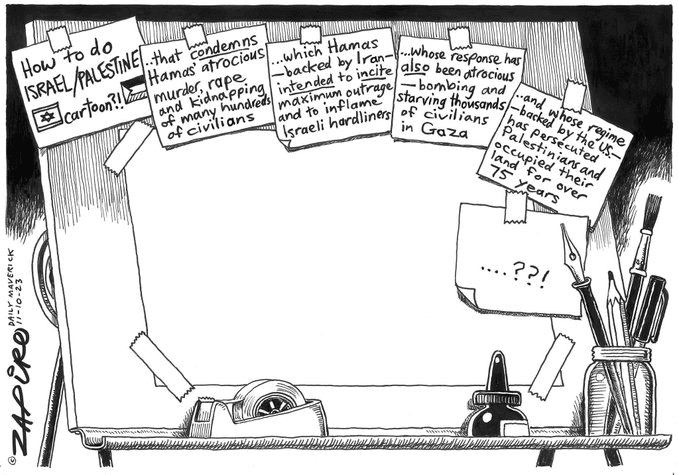
Zapiro speaks for a large number of cartoonists as they struggle to find something that is both fair and penetrating to say about the bloodbath going on in Israel and Gaza, with the additional burden of knowing that anything of any substance will — intentionally or not — be misinterpreted by a portion of your readership.
That latter factor is inevitable, the challenge being that any message that can’t be mistaken is likely so flabby and vacuous as to not say anything at all. You might be better off just doing a cartoon about teenagers’ saggy jeans than try to come up with something about the Middle East that doesn’t offend somebody.
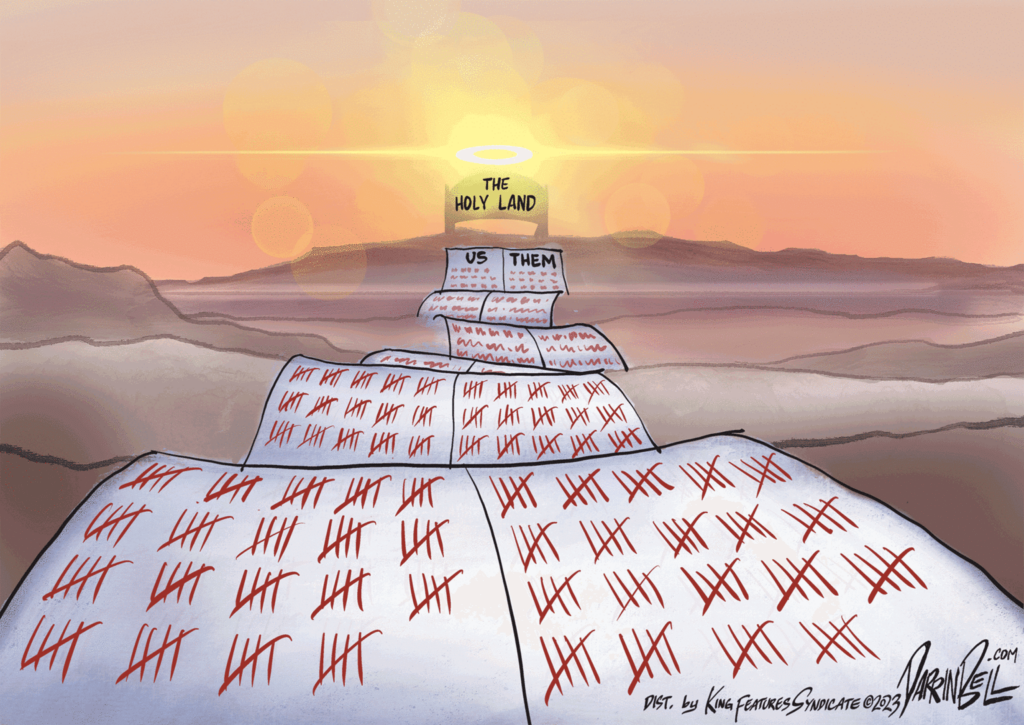
Darrin Bell (KFS) cautions against choosing sides and keeping score. The chief issue here is how you define “Us” and “Them,” and it’s long been poisoned by partisans who claim that their political group represents their ethnic/religious group.
If you want to spark misinterpretation, anger and hurt feelings, that’s an excellent place to start, because not all Palestinians support Hamas and not all Jews support the Israeli government, but, as noted here previously, both are more than likely to support “our lads” at least when speaking to the outside world.

Pat Bagley offers a more challenging viewpoint: While we should certainly be concerned for the innocent people caught in the middle, focusing on their plight is not the same as seeking a solution. It is not choosing sides to make obvious and necessary observations, while to act as if nobody is at fault, that it just happened, is foolish.
There can be no solution until you look at the situation. Mercutio’s dying curse, “a plague on both your houses” is a fitting cry from the heart, but, if you seek an answer, you’re better off considering MacDuff, who acknowledged that he must dispute it like a man, but insisted that he must also feel the deaths of his family as a man, asking “Did heaven look on and would not take their part?”

Once again, the question becomes one of defining “us,” because it’s easy enough to sit at a distance and tut-tut over things. But last night, at least some networks broke their usual rule and showed a photo of a murdered infant, making it harder for the home audience to dismiss it as something abstract, happening to “them.”
One might wish the networks had been equally as frank in covering Ukraine, but we shouldn’t use past failure as a guideline for the future, and Steve Breen recommends that we brace ourselves for being robbed of our ability to pretend it’s all happening to someone else somewhere else.
The world is too small to play that game anymore.

Matt Davies points out that Hamas, in its haste to bury Israel, has equally damaged Gaza’s prospects.
That’s an observation, not a case of taking sides against the Palestinians. But it is an observation based on the clear fact that, horrified by the war crimes of Hamas, people will indeed take sides against Gaza.

Meanwhile, Steve Brodner points out that Israel’s declaration of war on Hamas is being seen as a declaration of war on Gaza, and condemned as such by the UN’s Secretary General, among several other observers.
It is not taking sides with Hamas to observe that sealing the borders, including bombing of crossing points, is illogical in light of the Israeli government’s order that Gaza inhabitants leave, nor is it choosing sides to criticize the government for cutting off food, fuel and electricity to a civilian population that is trapped within a densely populated area.

Lisa Benson (Counterpoint) accuses Hamas as using Gaza as its own “playground,” making shields of the statelet’s children. It’s a complicated point, because, given the density of Gaza, there’s no place Hamas could use as a base of operations distinct from civilian areas.
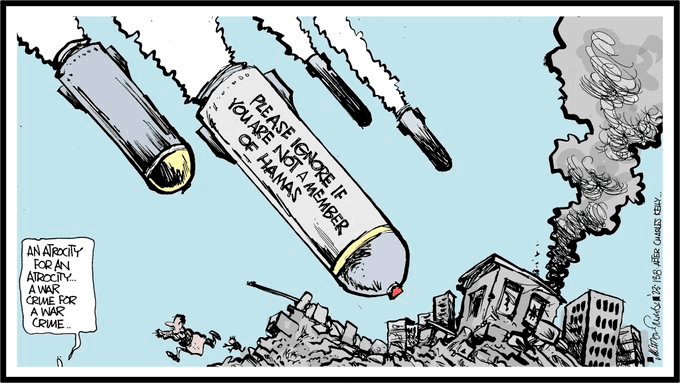
But Martyn Turner points out that this is something for the Israelis to factor into their response, and, once again, it is not a statement of support for Hamas to say that the larger, more sophisticated and better armed nation has a responsibility to operate accordingly.
It is also, I would suggest, not necessary to come up with a perfect solution before you are allowed to criticize one that is clearly flawed.
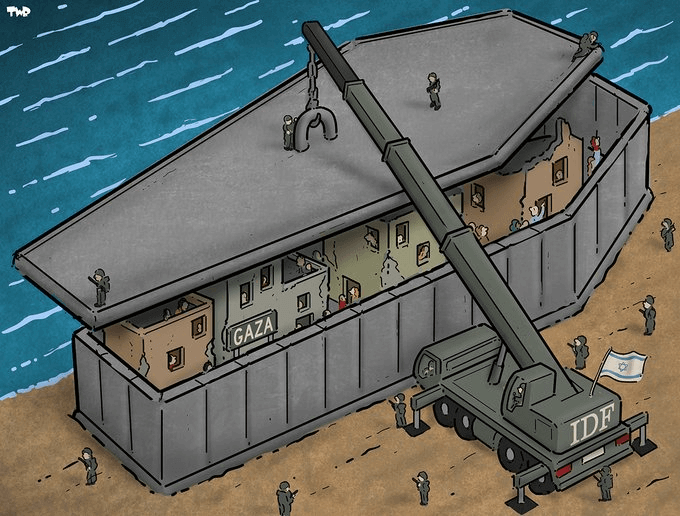
While Turner notes the obvious impossibility of rooting out Hamas with planes and bombs while sparing innocent civilians, Tjeerd Royaards (Cartoon Movement) offers a more pointed, blanket condemnation of Israel’s plan.
I’ve seen more forceful condemnations of Netanyahu which barely stop before taking sides with Hamas, but which suggest a level of intent that seems harsh if not entirely unfair. The plain fact, however, is that we expect heads of major nations to come up with reasonable approaches, if not perfect solutions.
Is that realistic? Do we have a right to expect developed nations to behave reasonably? And what is reasonable?
The uprising in Algeria against France was three-quarters of a century ago, Philippine rebellion against American occupation was more than a century past. Surely, in the years since, we’ve learned the futility of asymmetric wars between standing armies and scattered resistance.

Ah, well. As Guy Venables cautions, we should probably be a little suspicious of anybody who has an answer to the problem.

Besides, RJ Matson points out, we can’t come up with solutions to our own internal problems, as we wage a different sort of endless civil war within our borders, among our citizens.
Speaking of taking sides, Matson’s Uncle Sam favors both Ukraine and Israel, while many of our anti-government insurgents are aligning themselves with Russia and — though publicly declaring their support of Israel — have made common cause with anti-Semitic pressure groups.

Perhaps one saving grace is that we’re in no position to screw things up overseas. Within hours of posting this cartoon, Jack Ohman posted a message asking everyone to ignore it, since Scalise had withdrawn his bid for Speaker of the House because it was clear that he couldn’t summon the necessary support from his Republican colleagues to win election.

As Paul Fell puts it, we could be some time waiting for the GOP to decide to take its own side before we get to fret over whose side they’ll take in the Middle East.
Or even in the Midwest.
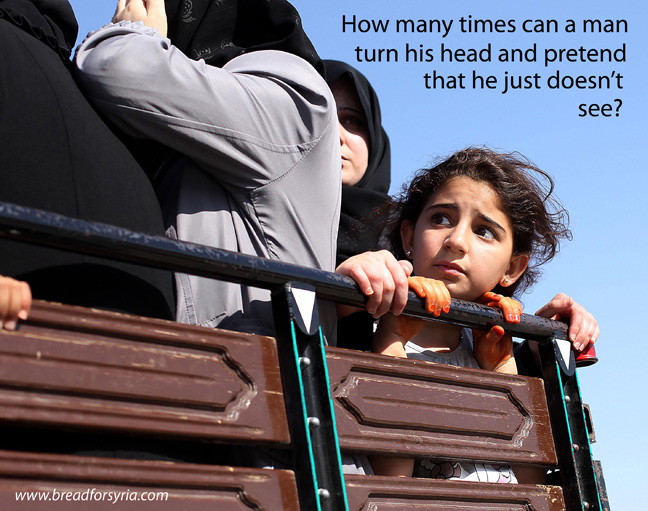
Not Gaza. Not Afghanistan. Not Iraq. Syria, a dozen years ago.
Always the same questions. Never an answer.

Mike, your opening paragraph sums it up so perfectly.
Thanks for the link to Tjeerd Royaards; if you’ve featured him before, I’ve overlooked it. He has a lot of very poignant cartoons (despite the language difference).